One of IKEA’s consistently most popular products, the POÄNG series recently celebrated its 46th year, and it doesn’t look a day over 30!
TABLE OF CONTENTS
1. History
2. Technical details
3. Slipcoverability
4. Our review
History
According to IKEA, the chair was designed by designers Noboru Nakamura and Lars Engman and was introduced in 1977. Originally named POEM, it was renamed to “POÄNG” in the 90s – presumably because “Poäng” sounds like “boing”? We can only wonder.
Learn how to pronounce “Poäng” and other interesting IKEA product names!
Since it was launched, more than 30 million units have been sold worldwide. You probably know someone who has the chair in their home, or have one yourself.
While the IKEA Poäng chair has become iconic in its own right, we can’t help but think that it has cast a shadow over its predecessor, Alvar Aalto’s Lounge Chair 406, which features the very same curving wooden frame. The Lounge Chair 406 doesn’t have a cushioned seat, but a sturdy linen webbing instead. Oh, let’s not forget the mind-boggling price tag of US$2494, which is about 8 times the price of a Poäng, (US$99-179).
The Lounge Chair 406 was designed in 1939, predating the POÄNG by almost 40 years.
Technical details
1. Chair

The Poäng armchair starts with the frame. The basic model is simply the curved wood veneer frame, currently available in the chair or rocking chair style.
The Poäng cushion dimensions are pretty much all the same and are interchangeable on the frames for the chair and rocker.
Covers for the rocking chair are currently available in:
- Hillared (anthracite, beige, dark blue)
- Knisa (black, light beige)
- Skiftebo (dark grey, yellow)
- Storudden (white/black)
- Glose (dark brown, off-white)
Covers for the armchair are currently available in:
- Hillared (anthracite, beige, dark blue)
- Knisa (black, light beige)
- Skiftebo (dark grey, yellow)
- Storudden (white/black)
- Glose (dark brown, off-white)
2. Footstool (known as the Ottoman in the USA)
Similar to the chair, the Poäng footstool starts with the frame first, and the cushion top varies.
Covers for the footstool are currently available in:
- Hillared (anthracite, beige, dark blue)
- Knisa (black, light beige)
- Skiftebo (dark grey, yellow)
- Storudden (white/black)
- Glose (dark brown, off-white)
Get slipcovers for your footstool here!
3. Children’s Armchair
It’s exactly the same as the armchair, only smaller! There is only one cushion type for the children’s armchair, which is similar to what we’re referring to as the attached neck cushion, but a few cheerful options for fabric covers.
Covers for the children’s armchair are currently available in:
- Medskog dinosaur pattern
- Knisa light beige
Side note: IKEA also offers a very similar chair called the PELLO. Unless you’re scrutinising both chairs side by side, it’s very difficult to differentiate the Pello, but the main difference is that the Pello’s arms are almost perpendicular to the backrest, whereas the Poäng’s curve upwards to meet the backrest.
Slipcoverability
Status: Covers are still available from IKEA.
Slipcover: Custom Poäng slipcovers for certain cushion types are available at Comfort Works.
Furniture measurements:
- Chair: 68 x 82 x 100 cm
- Footstool: 68 x 54 x 39cm
- Children’s armchair: 47 x 56 x 68cm
Our Review
Aesthetics: 7/10. When polling other people, there seem to be mixed opinions. The bare frame, composed of layer-glued wood veneer seems to give the chair a harsh, bare-bones overall look, compared to many traditional armchairs.
Comfort: 5/10. The cushion itself is passable, definitely not something you’d want to sink into considering there is only about 6cm of padding between you and the wooden frame.
Durability: 9/10. There is a reason every IKEA store has one of those plexiglas boxes, proudly displaying a 10-year warranty on the chair undergoing a pneumatic “stress test”. The test is supposed to simulate a lifetime use of an “average” adult repeatedly sitting and getting up. While we’ve never heard of anyone breaking the IKEA Poäng chair, before, I’d say that it has a great lifespan structurally. Stylistically, you’re likely to get bored of looking at it after a few years.
Price: Prices start from US$99 for the chair with a basic cushion and go up to US$289 in the quilted leather cushions. The starting price is still pretty tempting though!
Average score: 7.5/10
If you want to dress your old Poäng armchair with new slipcovers in a wide variety of fabrics, we make slipcovers that fit the versions with the attached neck cushion, stand alone neck cushion, as well as the footstool. If you aren’t sure which version you have, feel free to contact us!


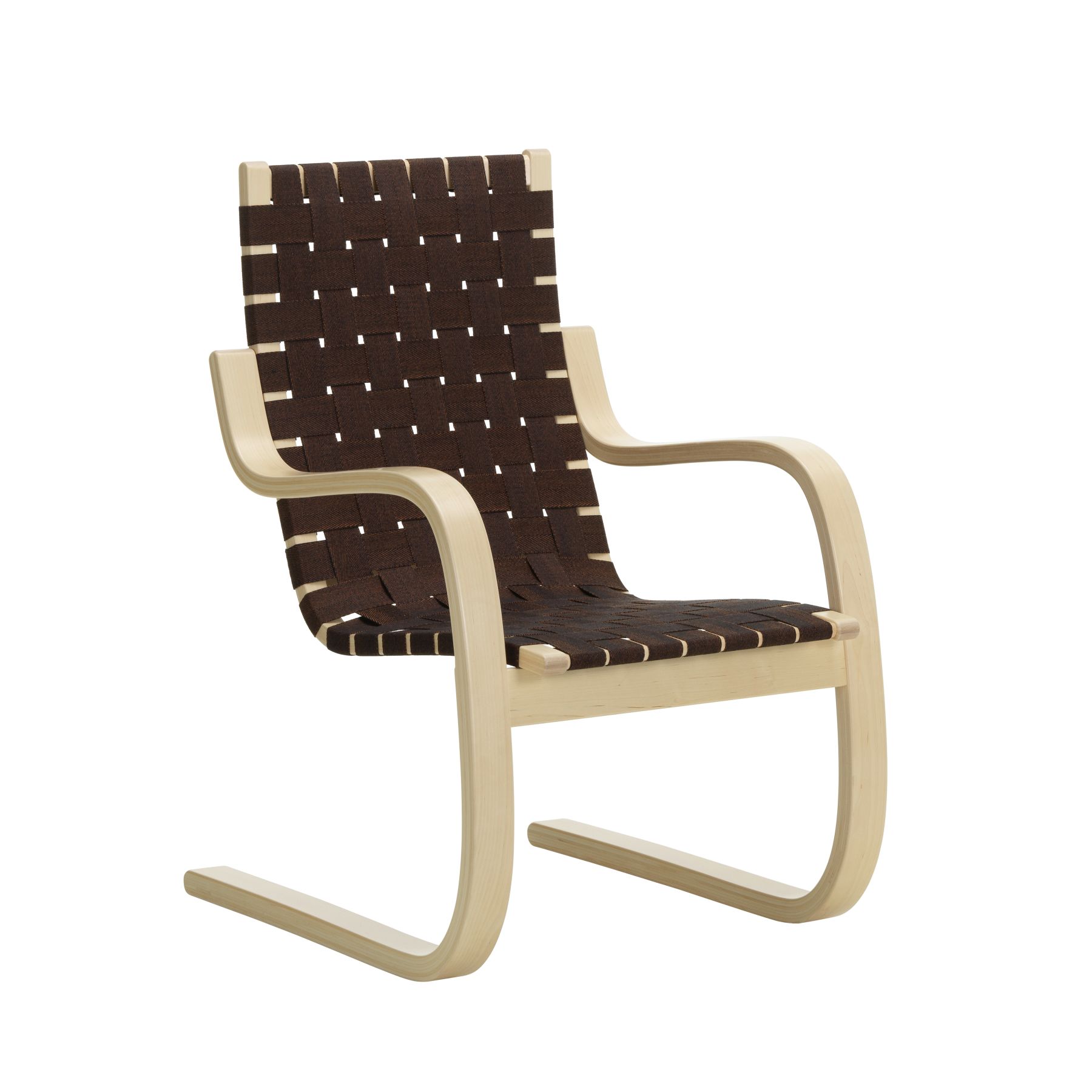
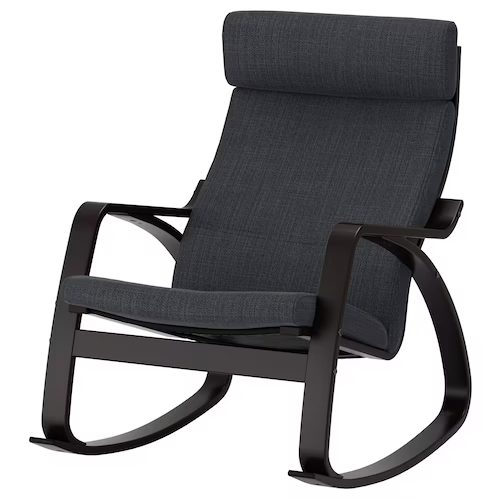
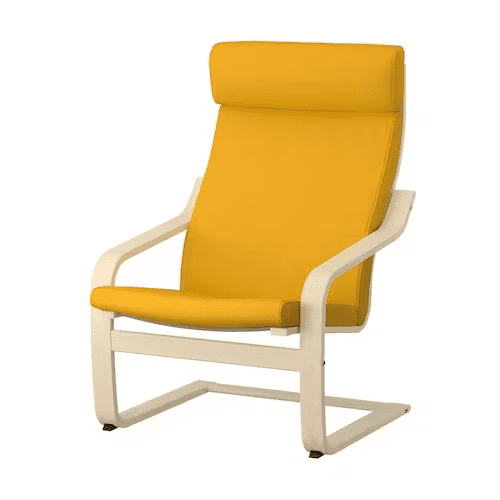
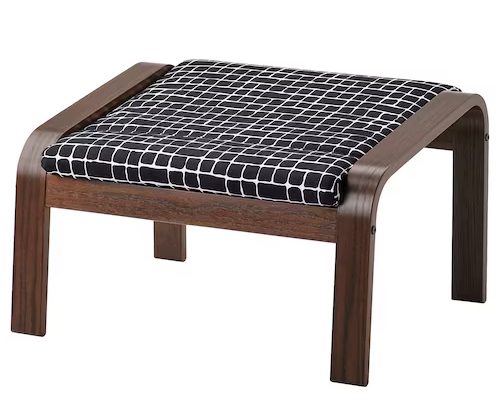
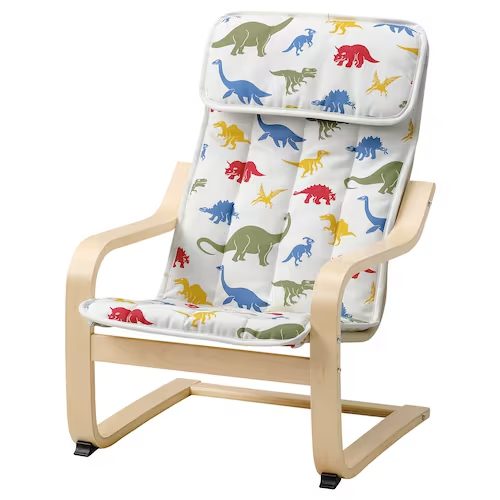
47 Comments
by Kate Jezyk
I just picked up an old Poang (I think) that has tubular steel for all of the frame except the arms/legs. It’s got a muslin-type fabric covering the steel, then a normal looking cushion sits on top of that. I think there’s a seat of webbing under the muslin (between the steel sides). Does anyone have a source for making a new cover for the steel? I saw this in a Fast Company article, “There have been tweaks to the upholstery color and pattern to keep the chair relevant with consumer tastes, but the biggest change happened in 1992. The chair’s seat was originally made from tubular steel, but in the early ’90s, the company switched to an all-wood frame and also narrowed the size.” I also want to replace the cushion, so replacements that are currently available won’t fit (if my chair is in fact wider). I’ve been looking all over the internet and not finding anything about this version of the chair.
by Naomi
Hey Kate,
We’d usually ask for photos before giving any suggestions -however; if you’d like to replace the cushion itself alongside getting slipcovers, we think it would be best to work with a local upholsterer who’ll be able to help you work around the tubular steel frame to achieve that nice, form-fitting look at the end of the day 🙂
Of course, if you’d like you may shoot us some photos anyway at in**@co**********.au and we’ll get back to you in a jiffy.
Best of luck! 🙂
by Earle
I prefer the Rocker version over the standard Poang. The rocking action is actually minimal, particularly on carpet, but the arms of the rocker are more level with the seat whereas the arms of the standard chair angle down towards the front of the seat. A matter of personal preference for body type but the ergonomics of the Rocker just work for me.
by John W Garten
I have a POANG armchair (813.058.07). Last Thursday night I sat on the chair and, without warning, the right side of the chair suddenly broke with a loud snap, in the vicinity of the front cross bar. This chair is probably about 10 years old. I have the assembly guide, but not the receipt. The number is on a tag on the bottom. I am 82 years old and weigh 215 pounds, use the chair often, but gently. I have pictures.
by Kay
Hi John, thank you for sharing this with us. We’re so sorry to hear about the mishap and we hope you’re alright. As we only make slipcovers for IKEA couches, we suggest you contact IKEA’s customer service regarding the POANG chair here: https://www.ikea.com/
Hope you’ll be able to get things sorted!
by Alfred
Greetings! Very useful advice in this particular article!
It is the little changes that make the largest changes.
Many thanks for sharing!
Also visit my web-site … lifestyle
by Eve
Hello there I am so excited I found your blog page,
I really found you by error, while I was browsing on Aol for something else,
Nonetheless I am here now and would just like to say thanks for a fantastic
post and a all round entertaining blog (I also love the
theme/design), I don’t have time to browse it all at the moment but I have saved it and also
added your RSS feeds, so when I have time I will be back to read a great
deal more, Please do keep up the awesome work.
Also visit my page – 백링크작업